Emboldened by President Obama's political struggles, foreign-policy hard-liners are stepping up efforts to press the administration to take a tougher stance -- and perhaps even launch an attack -- on Iran.
![iranhawks_echoesofiraq.jpg [Sen. Lindsey Graham's close ally McCain (R-Ariz.) urged Obama to "do something dramatically different" on Iran, by publicly "advocating regime change." (AP Photo/The Canadian Press, Andrew Vaughan) ]](http://www.commondreams.org/files/article_images/iranhawks_echoesofiraq.jpg) Sen. Lindsey Graham's close ally McCain (R-Ariz.) urged Obama to "do something dramatically different" on Iran, by publicly "advocating regime change." (AP Photo/The Canadian Press, Andrew Vaughan)
Sen. Lindsey Graham's close ally McCain (R-Ariz.) urged Obama to "do something dramatically different" on Iran, by publicly "advocating regime change." (AP Photo/The Canadian Press, Andrew Vaughan) Of course, advocates of an aggressive foreign policy have long talked up the notion of an attack on Iran as a means of preventing the Islamic republic from acquiring a nuclear weapon -- remember Sen. John McCain's "Bomb Iran" performance from the 2008 presidential campaign? But with a weakened president, the effort to promote a military strike is "definitely going into a higher gear" of late, Matthew Duss of the liberal Center for American Progress told The Upshot.
On Saturday, Sen. Lindsey Graham of South Carolina, a prominent Republican voice for an aggressive foreign policy, floated the idea of an all-out offensive against President Mahmoud Ahmadinejad's regime -- "not to just neutralize their nuclear program, but to sink their navy, destroy their air force and deliver a decisive blow to the Revolutionary Guard. In other words, neuter that regime. Destroy their ability to fight back."
Speaking at an international conference in Halifax, Canada, Graham held out the prospect of Republican support if President Obama goes beyond the administration's current policy of tough economic sanctions.
Graham is not alone. At the same event, his close ally McCain (R-Ariz.) urged Obama to "do something dramatically different" on Iran, by publicly "advocating regime change."
In late September, more than 50 House Republicans, including Minority Leader John Boehner, signed a letter to the president: "We urge you to take whatever action is necessary to prevent Iran from developing a nuclear weapon. All options should be on the table in curbing Iran's nuclear ambitions."
Just days before last week's midterms, Washington Post columnist David Broder raised eyebrows by arguing that Obama should ramp up arms production and create "a showdown with the mullahs" in order to kick-start the U.S. economy and boost his political standing. Versions of Broder's argument had already been made this year two separate times, by neoconservative foreign policy thinkers Elliott Abrams and Daniel Pipes. Abrams was a staffer on President George W. Bush's National Security Council, where he had strongly advocated for the invasion of Iraq. And Pipes, as the founder and director of the conservative Middle East Forum think tank, was also a staunch supporter of the Iraq war.
Obama has consistently advocated a diplomatic approach to dealing with Iran, and he's unlikely to do an about-face. But advocates of a military strike may be playing a longer game. Here again, critics point to the precedent of the Iraq invasion. During the 1990s, a well-connected group of neoconservative foreign policy thinkers, including Weekly Standard Editor Bill Kristol and Richard Perle, who would later chair the Defense Policy Advisory Board in the George W. Bush administration, worked with Republicans in Congress to pass the Iraq Liberation Act, making regime change in Iraq the official policy of the U.S. government. The legislation wasn't aimed at spurring then-President Clinton to launch an invasion -- there was little chance of that. Instead, the idea was to give the goal of regime change long-term momentum and a bipartisan veneer, since the law was signed by a Democratic president. That helped pave the way once the country had a Republican president more likely to sign off on an invasion.
Supporters of the Obama administration's diplomatic approach say that advocates of an Iran invasion are pursuing the same long-term strategy now.:By putting the issue on the table right now, Iran hawks are hoping to limit the president's room to maneuver, and make it easier for a future president to launch a military strike. "Iraq didn't happen in two months," Rubin told The Upshot, noting that it took five years from the passage of the Iraq Liberation Act in 1998 until the 2003 invasion. "So this is the playbook."
Indeed, Marc Lynch of Foreign Policy magazine wrote recently that he's anticipating "some kind of Iran Liberation Act on the horizon" from the GOP Congress.
Duss agreed. "You see them running a very similar game as they ran in the '90s," he said. During that period, Republicans and their allies frustrated many of Clinton's political goals, "then offered [the Iraq Liberation Act] as a way to be bipartisan."
And last week's election results give the hawks more leverage. "After the election, they feel the broader Obama agenda has been rejected," Rubin said. "There's a feeling they may have Obama a bit more on the ropes." And that, in turn, may make the president more willing to move toward the GOP on Iran policy, observers say. "Graham is saying: If [Obama] wants Republican support and bipartisanship, being tougher on Iran would work," according to Rubin.
Starting in January, advocates of a tougher line on Iran will have powerful allies in Congress who could help advance that plan. Rep. Ileana Ros-Lehtinen (R-Fla.), a veteran Iran hawk who has downplayed the effectiveness of sanctions, will take over as chairwoman of the House Foreign Affairs Committee.
Rubin, Duss and others who oppose the hawks' escalating rhetoric say there's no doubt that Iran is a genuine threat to world security. But they argue that publicly raising the threat of a military strike is likely to be counterproductive. "Launching a third war in the Middle East against a Muslim country," Rubin wrote in the Jewish Chronicle on Monday, "will increase our vulnerability to terrorist attack, will increase the likelihood that Iran will accelerate its nuclear program, will expose Israel to powerful military attack with unpredictable consequences, will place our troops in Iraq and Afghanistan at risk, will severely harm the Iranian people and will trigger a new oil crisis."
Still, the call for a more aggressive stance is winning support from America's top ally in the Middle East. On Sunday, Israeli Prime Minister Benjamin Netanyahu reportedly told Vice President Joe Biden that Iran must be made to fear a military strike -- a departure from Netanyahu's previous focus on diplomacy as the best counter to Iran's nuclear ambitions.
![train-blockade.jpg [Police approach a group of anti-nuclear activists who attached themselves to railway tracks to block a train (L rear) carrying nuclear waste to Germany during a protest near Caen November 5, 2010. Activists from "Sortir du nucleaire" (Phasing out the nuclear age) halted the train in the northwestern city of Caen after its departure from Valognes. ]](http://www.commondreams.org/files/article_images/train-blockade.jpg) Police approach a group of anti-nuclear activists who attached themselves to railway tracks to block a train (L rear) carrying nuclear waste to Germany during a protest near Caen November 5, 2010. Activists from "Sortir du nucleaire" (Phasing out the nuclear age) halted the train in the northwestern city of Caen after its departure from Valognes.
Police approach a group of anti-nuclear activists who attached themselves to railway tracks to block a train (L rear) carrying nuclear waste to Germany during a protest near Caen November 5, 2010. Activists from "Sortir du nucleaire" (Phasing out the nuclear age) halted the train in the northwestern city of Caen after its departure from Valognes. 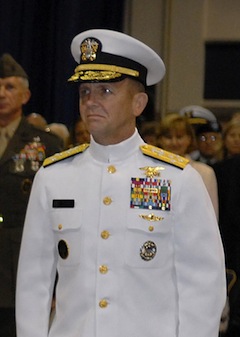 Fewer commandos are available for such hunts, Olson warned, because so many of them are committed to fighting these wars. He warned that the
Fewer commandos are available for such hunts, Olson warned, because so many of them are committed to fighting these wars. He warned that the 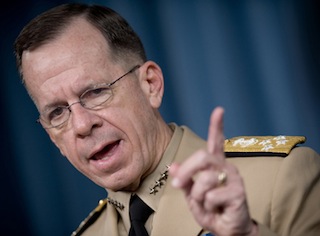 “
“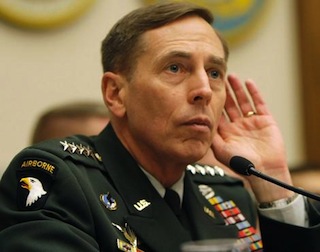 But it seems like the spin is even more surprising to the Pentagon leadership, as Gen. David Petraeus was pressed today on whether this was the right time to have left Iraq, and he said what he most likely wasn’t supposed to say.
But it seems like the spin is even more surprising to the Pentagon leadership, as Gen. David Petraeus was pressed today on whether this was the right time to have left Iraq, and he said what he most likely wasn’t supposed to say. Confidence is now plummeting, with 68% saying they feel “less confidence” about whether the war will reach a successful conclusion. Perhaps even more importantly, for the first time yet, the poll shows, the American public generally disapproves of the president’s handling of the Afghan War. The 44%-45% opposition was a stark drop in popularity of the war from five months ago, when they generally approved 53%-35%
Confidence is now plummeting, with 68% saying they feel “less confidence” about whether the war will reach a successful conclusion. Perhaps even more importantly, for the first time yet, the poll shows, the American public generally disapproves of the president’s handling of the Afghan War. The 44%-45% opposition was a stark drop in popularity of the war from five months ago, when they generally approved 53%-35% But while the “drawdown” is of political expedience at the moment,
But while the “drawdown” is of political expedience at the moment, 
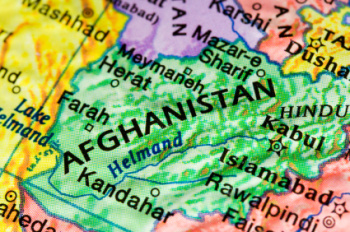 The UNAMA report stood in contrast to a separate report released on Sunday by the Afghan government, which claimed only a
The UNAMA report stood in contrast to a separate report released on Sunday by the Afghan government, which claimed only a 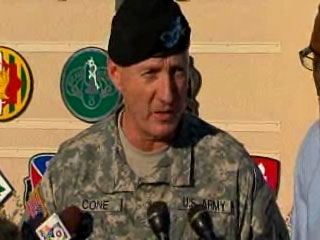
 “
“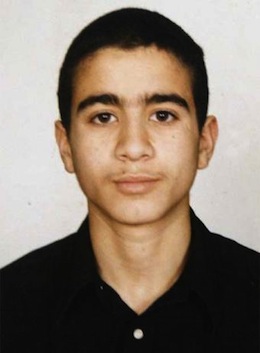 Khadr, a Canadian citizen, was 15 years old when he was arrested. Now 23, he is charged with having thrown a grenade at US troops during the Afghan War, and is being labeled an “unprivileged enemy belligerent” to explain the charges, as throwing a hand grenade during a war is not generally considered a war crime.
Khadr, a Canadian citizen, was 15 years old when he was arrested. Now 23, he is charged with having thrown a grenade at US troops during the Afghan War, and is being labeled an “unprivileged enemy belligerent” to explain the charges, as throwing a hand grenade during a war is not generally considered a war crime.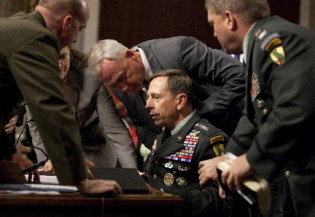 While the
While the 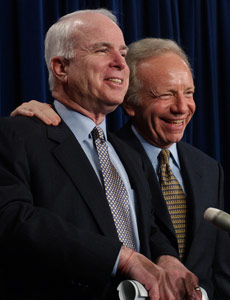 Sen. McCain
Sen. McCain  South Korea is holding a naval drill in the sea today, with warships firing guns and
South Korea is holding a naval drill in the sea today, with warships firing guns and 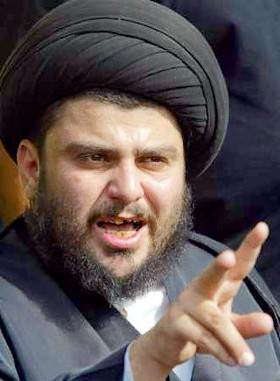 Commanders
Commanders 


